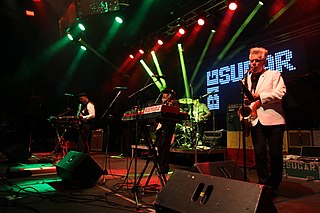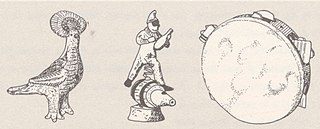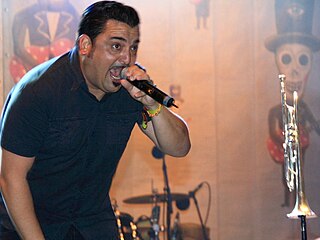
The Coup is an American hip hop band from Oakland, California. Their music is an amalgamation of influences, including funk, punk, hip hop, and soul. Frontman Boots Riley's revolutionarily-charged lyrics rank The Coup as a renowned political hip hop band aligned to radical music groups such as Crass, Dead Prez and Rage Against the Machine.

Télépopmusik is a French electronic music trio, composed of Fabrice Dumont, Stephan Haeri, and Christophe Hetier.

Big Sugar is a band formed in Toronto in 1988 by Gordie Johnson, the band's lead singer, lead guitarist and main songwriter. Between 1996 and 2016, Big Sugar was among the top 25 best-selling Canadian bands in Canada. They are still active today, releasing new music, vinyl re-releases and touring.

James Kottak was an American drummer, best known for his work with the German hard rock band Scorpions, which he joined in 1996. At the time of his firing from the band in 2016, he was their longest-serving drummer. Kottak was also an original member of Kingdom Come, of whom he was their drummer from 1987 to 1989 and again from 2018 to his death in 2024.

Steve Coleman is an American saxophonist, composer, bandleader and music theorist. In 2014, he was named a MacArthur Fellow.
Alberto y Lost Trios Paranoias were an English comedy rock band, formed in Manchester, England in 1973. Their story is told in CP Lee's book When We Were Thin. The name of the band is a corruption of the Paraguayan band Alberto y Los Trios Paraguayos.

Nigel Olsson is an English drummer, best known for being a life-long member of the Elton John Band. He has had an equally long career as a session musician and composed, recorded and produced albums as a solo artist.

Regional styles of Mexican music vary greatly from state to state. Norteño, banda, duranguense, Son mexicano and other Mexican country music genres are often known as regional Mexican music because each state produces different musical sounds and lyrics.

Italian folk music has a deep and complex history. National unification came quite late to the Italian peninsula, so its many hundreds of separate cultures remained un-homogenized until quite recently. Moreover, Italian folk music reflects Italy's geographic position at the south of Europe and in the center of the Mediterranean Sea: Celtic, Slavic, Arabic, Greek, Spanish and Byzantine influences are readily apparent in the musical styles of the Italian regions. Italy's rough geography and the historic dominance of small city states has allowed quite diverse musical styles to coexist in close proximity.
Italian popular music is musical output which is not usually considered academic or classical music but rather has its roots in the popular traditions, and it may be defined in two ways: it can either be defined in terms of the current geographical location of the Italian Republic with the exceptions of the Germanic South Tyrol and the eastern portion of Friuli-Venezia Giulia; alternatively, it can be defined as the music produced by all those people who consider themselves as Italians and openly or implicitly refer to this belief. Both these two definitions are very loose: due to the complex political history of the Italian Peninsula and the different independent political states, cultural and linguistic traditions which sprang within them, it is rather difficult to define what may be considered to be truly Italian. Since before the formation of a unified educational system and the spread of information through the radio and the press during the 1920s, all the different cultural and linguistic groups within the country were independent of one another, and a unified Italian country was still only a political or ideological concept far from the daily life.

Nonstop was a Portuguese girl group, created through TV reality-competition show Popstars, in 2001. Nonstop achieved notable success with their debut album, Nonstop, and single, "Ao Limite Eu Vou".

Mau Mau is an Italian band from Turin, formed in 1990 by Luca Morino, Fabio Barovero (accordion) and Tatè Nsongan (Djembe). With roots in the underground cult group Loschi Dezi, the band draws its influences from world music, especially Mediterranean, African, Arabic and Latin traditions. They mainly sing in native Piedmontese. The band's name has a double meaning: it references the Kenyan Mau Mau uprising against British colonial rule, and in Piedmontese, Mau Mau designates "people who come from afar".
La Passione is a 1996 British drama film written and produced by Chris Rea, directed by John B. Hobbs, and starring Sean Gallagher, Paul Shane and Shirley Bassey. The film premiered on 14 November 1996 at the BFI London Film Festival. The film features a cameo appearance by Rea, as well the same-titled soundtrack also composed by him. The soundtrack reached the #43 position in UK album charts, and was certified Silver by BPI in 1997.
George Terry is an American rock and blues guitarist and songwriter best known for his work with Eric Clapton in the 1970s and as a session musician with other artists, including ABBA, the Bee Gees, Joe Cocker, Andy Gibb, Freddie King, Diana Ross, Stephen Stills, and Kenny Rogers.
Spaccanapoli, now known as Spakka-Neapolis 55, is a musical group from Naples.

Rosario (Roy) Paci is an Italian trumpeter, singer, composer and arranger.

The LP World Tour 2009 was the fifth concert tour by Italian singer Laura Pausini, starting in Brescia on 28 February 2009 and ending in Milan on 23 December 2009. This tour was in support of Pausini's album Primavera in anticipo / Primavera anticipada which was released in 2008.

The Inedito World Tour was the sixth world tour by Italian singer Laura Pausini, in support of her eleventh studio album, Inedito / Inédito. It was planned to visit America, Europe, and Australia but ended on 15 September 2012, after Pausini announced she was pregnant. Due to the announcement, the tour was cut short, and plans for a second American leg, a second European leg, and the tour's debut in Australia were cancelled.

Giovanni Pellino, best known as Neffa, is an Italian singer, songwriter, rapper, and record producer. He is a pioneer of Italian hip hop scene.

La mia banda suona il pop is a 2020 Italian musical comedy film directed by Fausto Brizzi.














